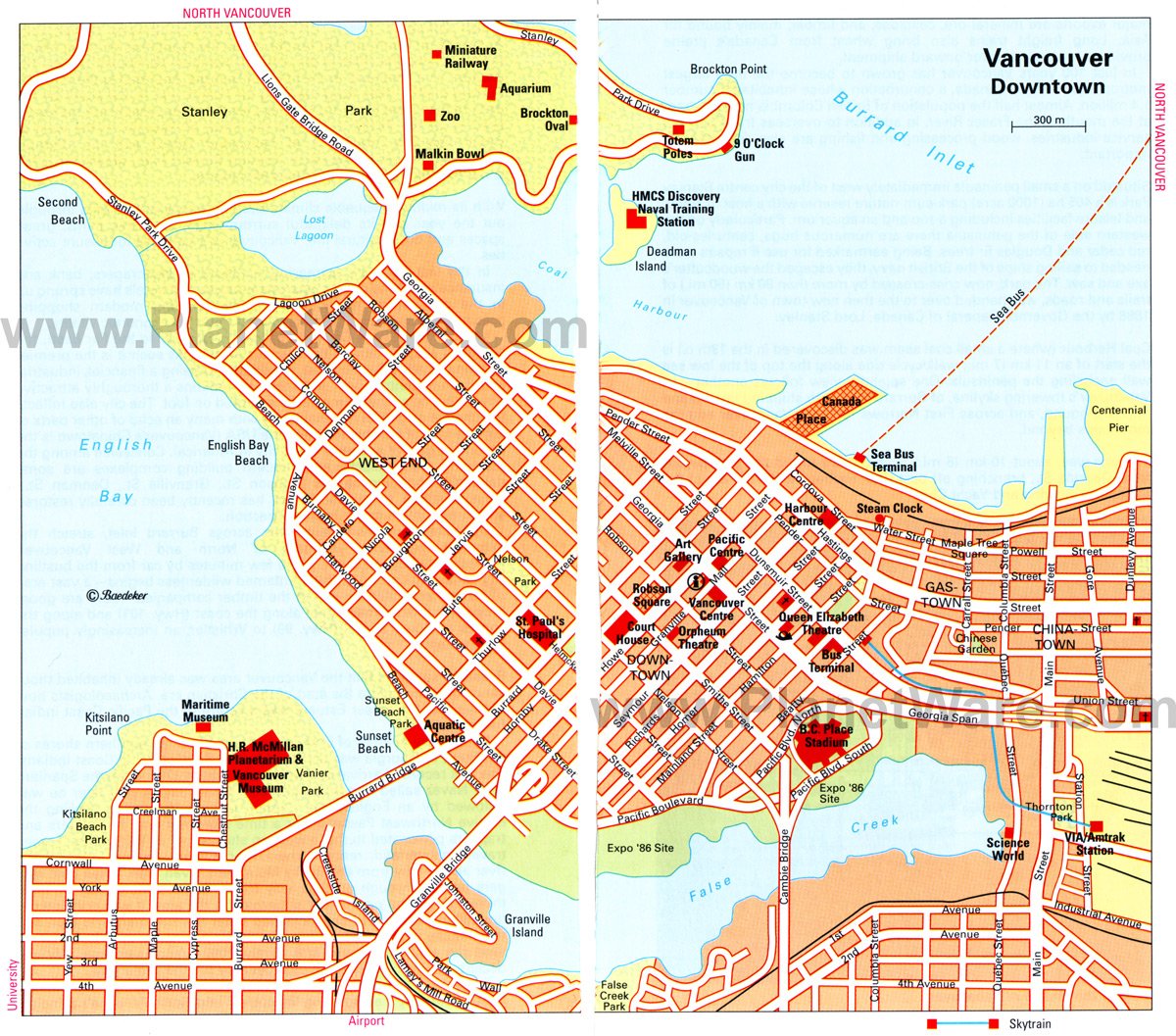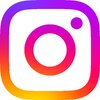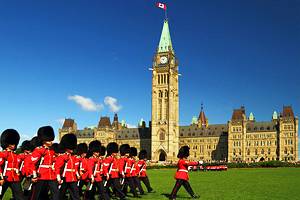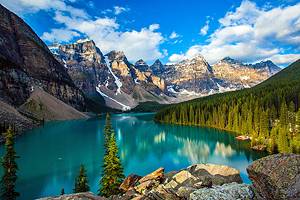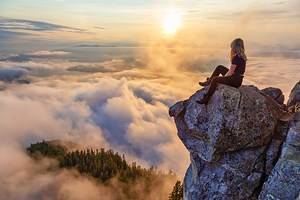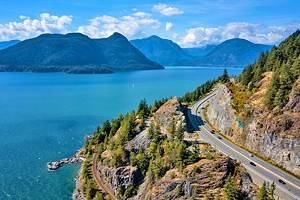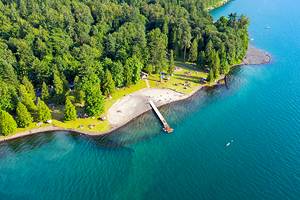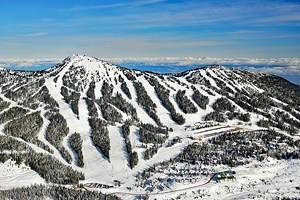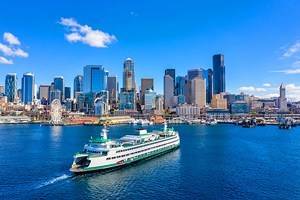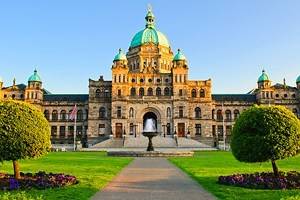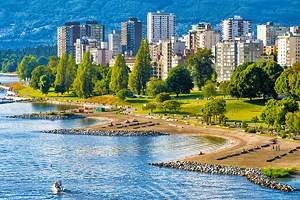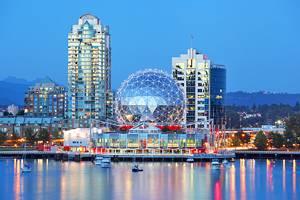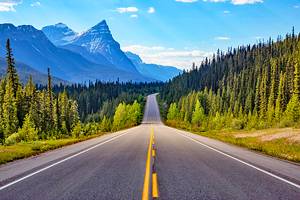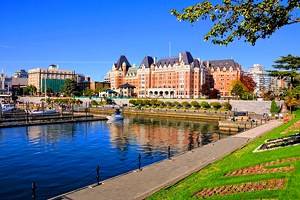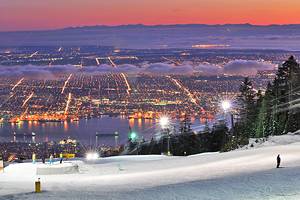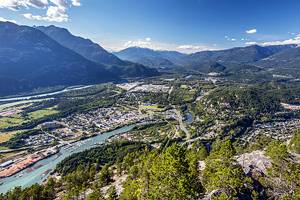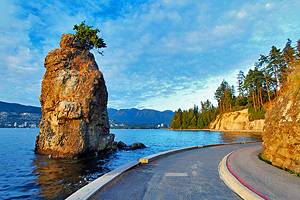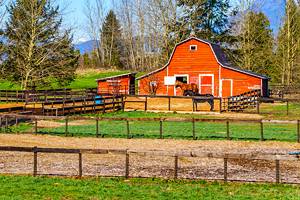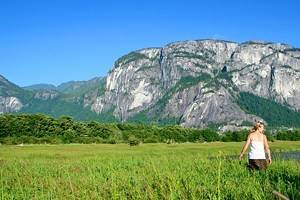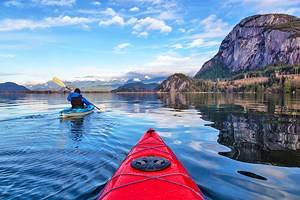Tourist Attractions & Places to Visit in Vancouver, BC
Author Michael Law has lived in Vancouver and returns frequently, usually adding on some time to ski at Whistler.
With its mountain backdrop and urban beaches, Vancouver has the well-deserved reputation of being one of the most beautiful cities in the world.
Downtown Vancouver is picturesquely situated on a peninsula in the Strait of Georgia, with the often snow-covered ranges of the Coast Mountains rising behind. The setting is one of the city's main attractions.
With its extensive parks and agreeable climate keeping temperatures mild throughout the year, outdoor activities are high on the list of things to do in Vancouver. But it also boasts a busy cultural life, fantastic shopping, and incredible dining. This scenic city was showcased to the world when it hosted the 2010 Winter Olympics, in conjunction with nearby Whistler.
Find your way around the city with our list of attractions and things to do in Vancouver.
Go for a Walk in Stanley Park
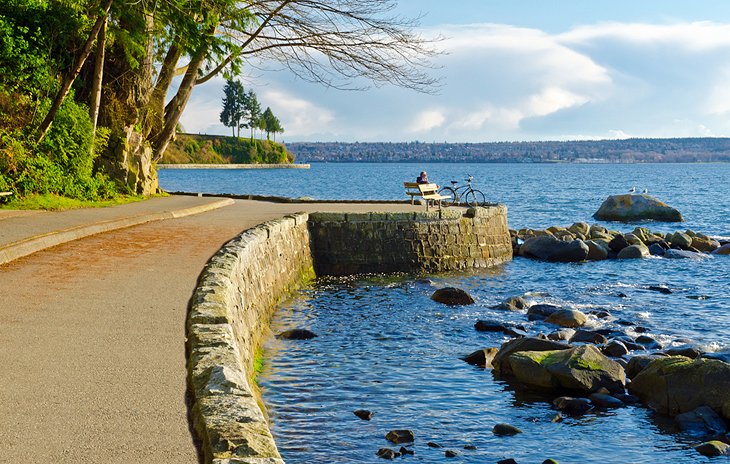
Stanley Park is a lush peninsula of huge trees adjacent to downtown Vancouver and one of the city's great treasures. If you are looking to get outside and enjoy some nature, this is the best place to visit in Vancouver.
A paved seawall path encircles the green space and is a wonderful place to explore on foot or by bicycle. A network of inland trails offers a completely different feel, with towering old-growth trees, serene beaver lakes, and fewer crowds.
Inland, the park offers many things to do, and you can spend a full day exploring attractions like the totem poles at Brockton Point or the Vancouver Aquarium. Spectacular views are a standard throughout the park, either back towards the city or out to the ocean.
Come spring, the park's gardens and shrubs burst into a rainbow of beautiful colors, led by the cherry trees and closely followed by the rhododendrons.
In the summer, an outdoor pool operates right at the edge of the ocean. This 80-meter pool is heated and is a popular spot for families because of its gently sloped entry.
For those who are not afraid to brave the chilly ocean temperatures, the park has two main beaches: Second Beach and Third Beach, both with nice sand and large logs to lean against.
Do Some Shopping on Granville Island
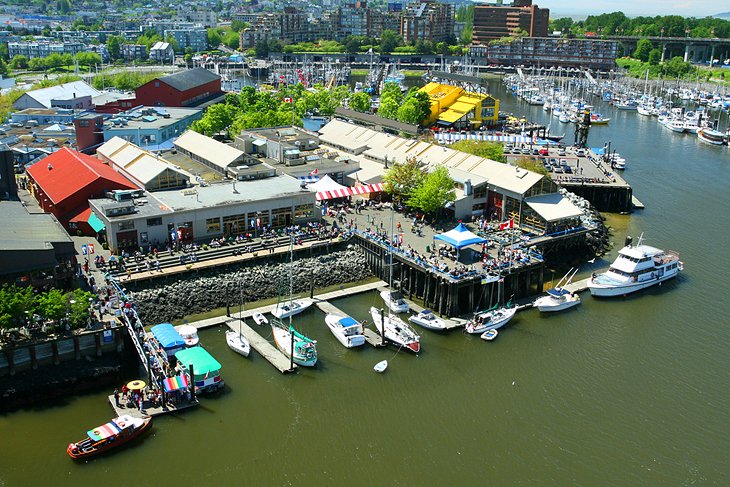
Once mainly industrial, Granville Island is now a thriving center of activity with a relaxed and distinctive atmosphere. Artists and retailers have moved into converted warehouses alongside houseboats, theaters, galleries, and restaurants.
The Granville Island Public Market is one of the most popular attractions, selling fruit and vegetables, seafood, and a great variety of other specialties as well as ready-to-eat items. Not truly an island, the arts hub is linked to residential areas by one road and footbridges to the south, and to the Downtown peninsula (across False Creek) by ferry.
Location: South of and underneath the Granville Street Bridge
See the Brockton Point Totem Poles
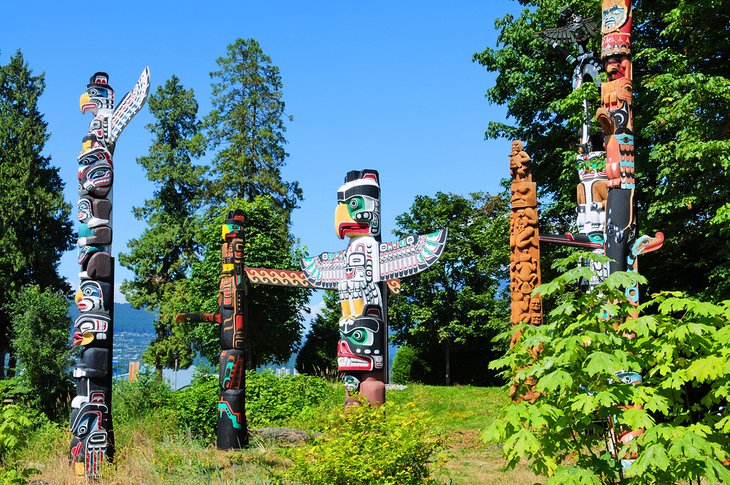
The Brockton Point Totem Poles are a must-see when visiting Stanley Park. These intricately carved poles are one of the top attractions in British Columbia. The totem poles were first placed in the park at a different location in the 1920s, and over the years, the collection grew and was eventually moved to Brockton Point.
Today you'll find nine totem poles carved from red cedar in addition to three gateway portals. The colorful totem poles line a wide walkway and are set back against tall evergreen trees. Nearby is a visitor center that provides additional insight into First Nations history and the totem poles themselves.
Grouse Mountain
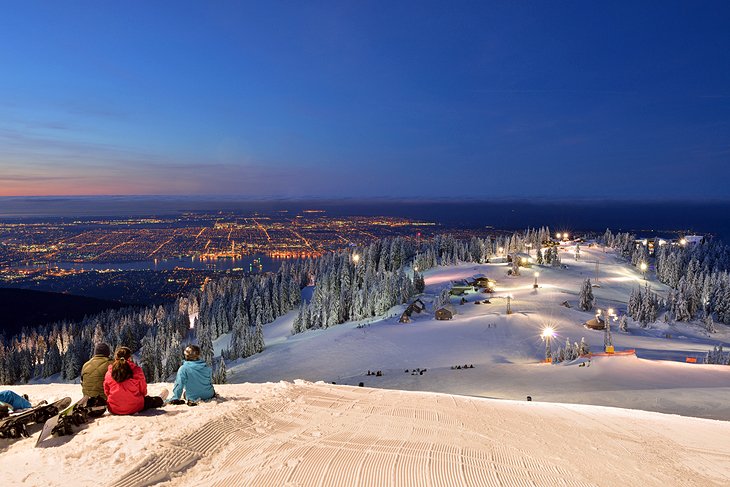
In both winter and summer, Grouse Mountain offers an unmatched panorama in clear weather. That's especially so in the evenings when the city lights are on. A gondola operates daily, running from street level to the summit, where dining, activities, and wildlife await mountaintop explorers year-round.
When the snow flies, Grouse Mountain is a winter wonderland offering outdoor skating, snowshoeing, and some of the best skiing and snowboarding near Vancouver. The ski runs are not particularly difficult, and Grouse Mountain is a fun family outing. It's also a great place to learn how to ski.
Come summer, Grouse Mountain is a hiker's paradise with trails, including the famed Grouse Grind - affectionately called Mother Nature's StairMaster. Mountain biking is also popular at the Grouse Bike Park, while ziplining, ropes courses, and tandem paragliding round out the activities. For a less strenuous option, take the Blue Gondola up to the top for incredible views out over Vancouver and Burrard Inlet.
A little-known fact is that Grouse Mountain has a Wildlife Refuge. Here you'll find resident grizzly bears Grinder and Coola, along with other forest creatures.
Address: 6400 Nancy Greene Way, North Vancouver, British Columbia
Visit the Vancouver Aquarium
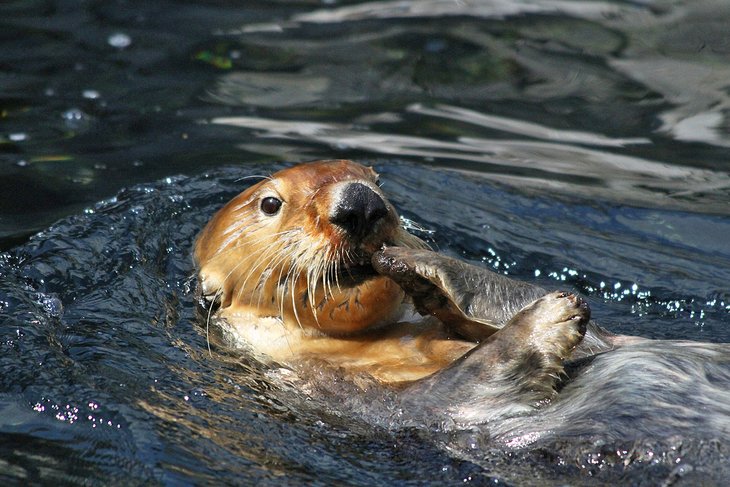
A trip with the family to Stanley Park for most folks would be incomplete without visiting the Vancouver Aquarium. This wonderful facility teaches young and old about the wonders of the ocean and how we can protect it.
Experiences: Fun and entertaining experiences include a cold-water touch tank; a wildlife rescue area complete with a Burmese tortoise; Penguin Cove, full of cute creatures; and the non-stop action of the sea otters in their habitat. One thing not to miss is the 4D Theatre Experience with special seats, effects, and a large screen that make you feel you are part of what you are seeing.
Exhibits in the aquarium educate visitors on the unique habitats of the Amazon, the tropics, and BC's Wild Coast.
In the past, the aquarium used to have whale performances and belugas; however, the animals have since died and have not been replaced, or they have been relocated.
Address: 845 Avison Way, Vancouver, British Columbia
Visit the Museum of Anthropology
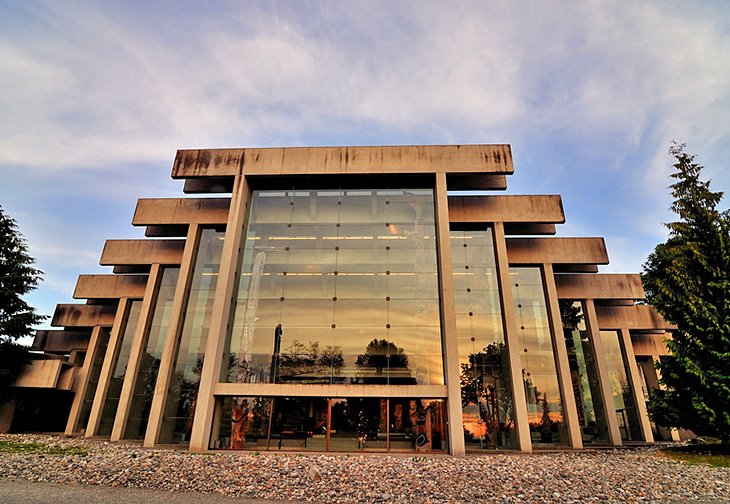
Part of the University of British Columbia, the Museum of Anthropology deals with cultures from around the world, but places particular emphasis on British Columbia First Nations.
The museum's design, by famed innovator Arthur Erickson, is itself a work of art. The concrete and glass are meant to mimic the post-and-beam construction of traditional First Nations longhouses.
Exhibits display native art, including large totem poles in the Great Hall. Other presentations explore ethnographic and archaeological objects representing Asia, the South Pacific, the Americas, Africa, and Europe.
Other attractions on the university campus include the clothing-optional shoreline of Wreck Beach, the natural-history-focused Beaty Biodiversity Museum, and the rambling UBC Botanical Garden with its many interesting plantings and delicate Nitobe Japanese Garden.
Address: 6393 NW Marine Drive, Vancouver, British Columbia
Relax on Kitsilano Beach
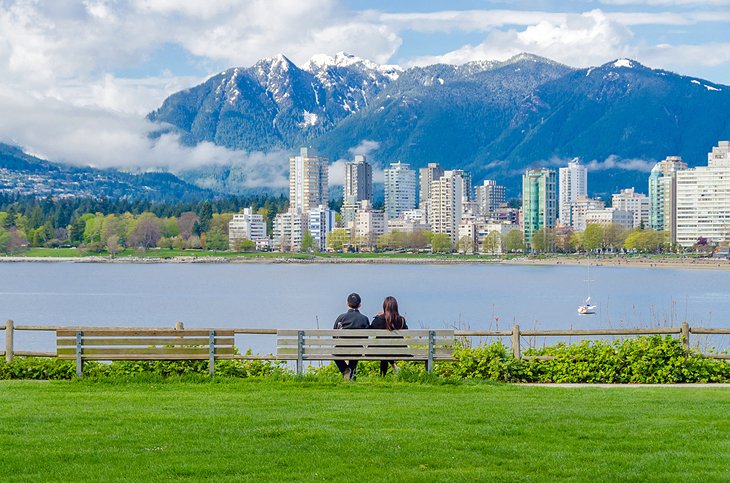
The sandy shoreline of Kitsilano Beach defines the laid-back, fun-loving Vancouver lifestyle. It's a place locals hang out with friends or take a dip in the outdoor heated seawater swimming pool, one of the longest saltwater pools in North America. The wide beach here is popular with sunbathers in the summer, and volleyball courts are nearby.
Views from Kitsilano over the city center are wonderful. In addition to the beach and oceanfront, the area has a number of cafés and walking trails, and a vibrant shopping strip lies a few blocks south on West Fourth Avenue.
A short stroll to the east of Kitsilano is Vanier Park, where you'll find wide-open spaces and the Vancouver Maritime Museum. Catch a small Aquabus to downtown Vancouver or Granville Island from the docks located here.
Address: 2305 Cornwall Ave, Vancouver, British Columbia
- Read More: Beaches in Vancouver, BC
Explore Gastown
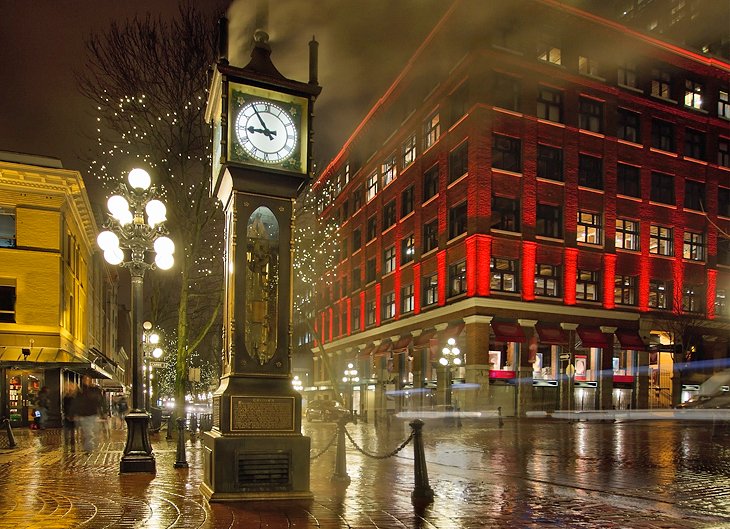
The oldest part of the city, Gastown is an area of restaurants, galleries, and shops set in carefully restored Victorian buildings. Heritage structures, cobblestone streets, and iron lampposts give the district its distinctive atmosphere. Gastown is a short walk from Canada Place.
Gastown came into existence in 1867 when a man called John Deighton arrived on the scene. Deighton had a habit of launching into lengthy stories and soon acquired the nickname "Gassy Jack." As a result, the vicinity became known as "Gassy's Town" or "Gastown."
A statue of the proprietor now watches over the neighborhood in Maple Tree Square. Tourists stop for photos with Gassy Jack, and also love to visit the nearby Steam Clock, which puffs steam-powered chimes every 15 minutes.
Tour Canada Place
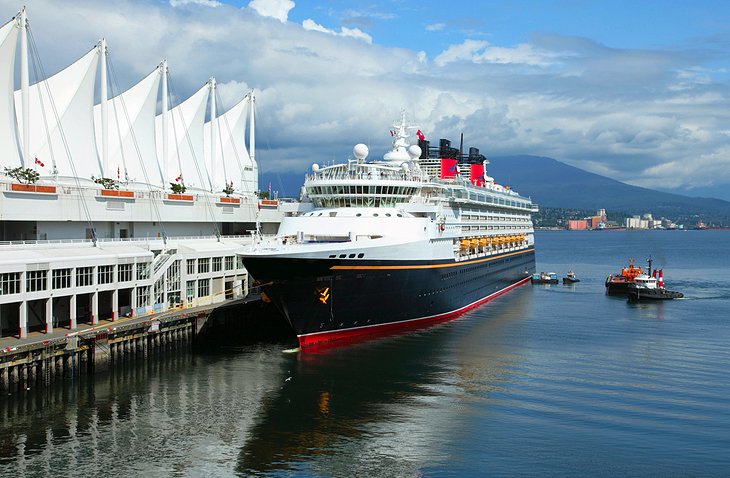
If you arrive in Vancouver on a cruise ship, Canada Place is where your trip begins. The unusual roof design creates the impression of a huge sailing vessel. The architecturally remarkable structure is part cruise ship terminal, part convention center and hotel, and part hub for sightseeing bus tours. The Olympic Cauldron from the 2010 Winter Games is located just outside the building.
At the end of the pier are panoramic views and the Flyover Canada attraction - a flight simulator that assaults all your senses while giving you a Canadian geography lesson. Also nearby, Waterfront Station is a major transit hub with ferries departing for the public market at Lonsdale Quay in North Vancouver.
If you exit the building and turn right, a scenic waterfront walk towards Stanley Park begins. Along the way, you'll see the seaplanes take off and land, and massive seagoing container ships heading out to sea.
Address: 999 Canada Place, Vancouver
Soak Up Some Culture in Chinatown
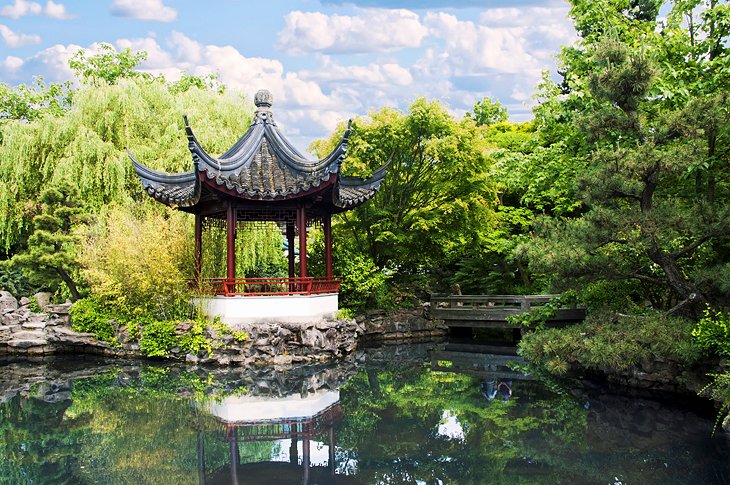
Beyond the ornate Millennium Gate marking its entrance, Vancouver's exotic and interesting Chinatown features modern buildings amid many older ones dating from Victorian times.
Signs at shops and restaurants are often written in Chinese characters, particularly along East Pender, Keefer, and Main streets – the main shopping areas. Local attractions include the pretty walled Dr. Sun Yat-Sen Classical Chinese Garden, modeled after a traditional garden from the Ming Dynasty.
Also worth seeing is the Sam Kee Building, which at barely two meters wide, claims to be the narrowest office building in the world. Every year, Chinese New Year is celebrated with an exuberant parade.
Go for a Stroll in English Bay
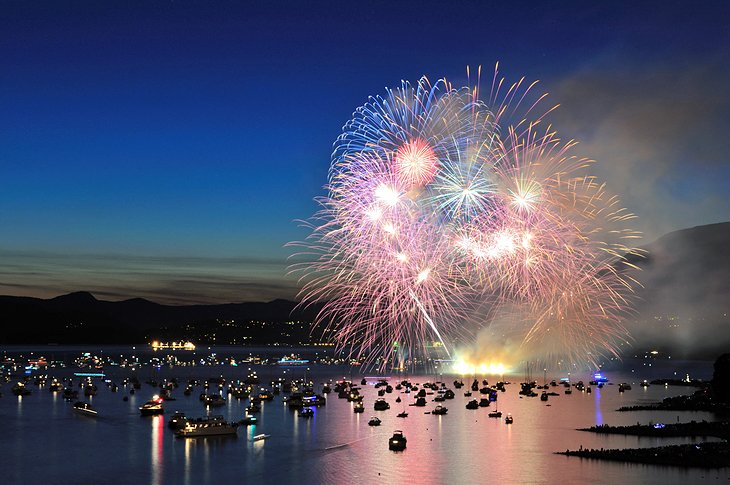
Oceanfront English Bay centers on one of the city's loveliest and busiest beaches. Part of the West End neighborhood, English Bay offers shopping and high-end restaurants, but is also a popular outdoor area where people come to walk, bike, rollerblade, or hang out with the public art installations like Laughing Men (A-maze-ing Laughter), by Yue Minjun.
English Bay is not far from Stanley Park, and a waterfront trail joins the two. The beach is strewn with large tree trunks, which make a perfect back rest for sunbathers.
One of the biggest events of the summer is the Celebration of Light. Generally occurring around the last week of July, spectacular fireworks are set to music. Another popular event is the New Year's Day Polar Bear Swim, when hardy swimmers take a dip in the chilly Pacific waters.
Walk across the Capilano Suspension Bridge
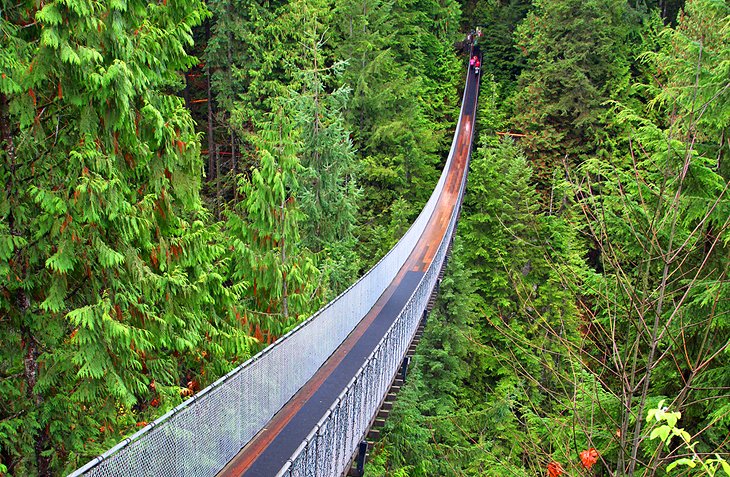
Vancouver's first tourist attraction, the Capilano Suspension Bridge opened in 1889 and has been thrilling visitors with its swaying bridge over a plummeting canyon ever since. The footbridge spans a 70-meter deep river canyon leading to an activity park filled with forest trails and a treetop walk through old-growth giants. There's also a collection of totem poles and a transparent suspended platform known as the Cliffwalk.
Also along Capilano Road, Capilano Salmon Hatchery is worth a visit (in fall especially) to spot flashing salmon as they try to swim upstream. The fish ladder - a series of staggered pools - allows fish to bypass Cleveland Dam. Check out the underwater windows for a first-hand look at their efforts.
Try to time your visit for early morning or late afternoon to avoid the tour buses and crowds.
Address: 3735 Capilano Road, North Vancouver, British Columbia
Take a Ride on the Aquabus
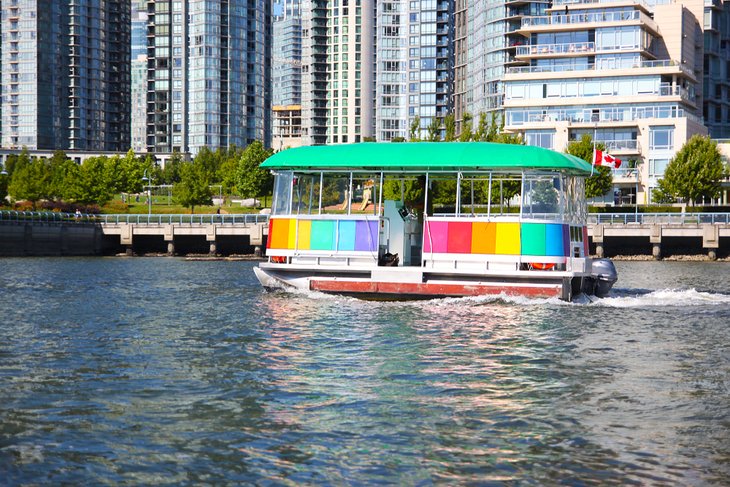
One of the best views of Vancouver is, fortunately, one of the cheapest. Jump on the small Aquabus and bob your way across and around False Creek while soaking up the incredible views.
Eight pickup points are strategically placed around the downtown waterfront. It's a great way to take a mini-tour of False Creek, offering unique perspectives on the city skyline, Granville Island, and Science World from the water.
You'll never have to wait long, one of the colorfully painted 13 Aquabuses will be by to pick you up every 15 minutes. The boats are pet-friendly, bike-friendly, and can accommodate wheelchairs. The Aquabus is particularly handy if you are walking around downtown and would like to grab lunch or do a bit of shopping at Granville Island.
If you plan to do a lot of riding, purchasing a day pass is the best deal.
Shop Robson Street
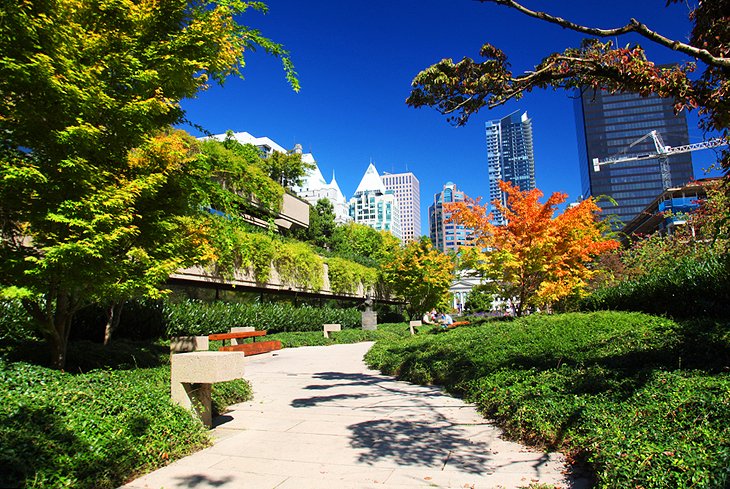
Robson Street is best known for shopping. But international brand names aside, it's also the setting for many inventive Vancouver happenings.
The main hub of activity on Robson Street is centered between Burrard and Denman Streets. Over these three blocks, you'll find over 150 stores and restaurants. Take a stroll up and down the street, and see if you can snag a patio seat to engage in some serious people watching. For more retail, head over to Alberni Street between Burrard Street and Bute Street for high-end luxury brands, in Vancouver's so-called "Luxury Zone".
Robson Street is central to many of the city's top attractions, so a visit here is easily combined with a stop at the Vancouver Art Gallery or nearby Robson Square.
Location: Robson Street at Hornby Street, Vancouver, British Columbia
Learn about History at the Museum of Vancouver
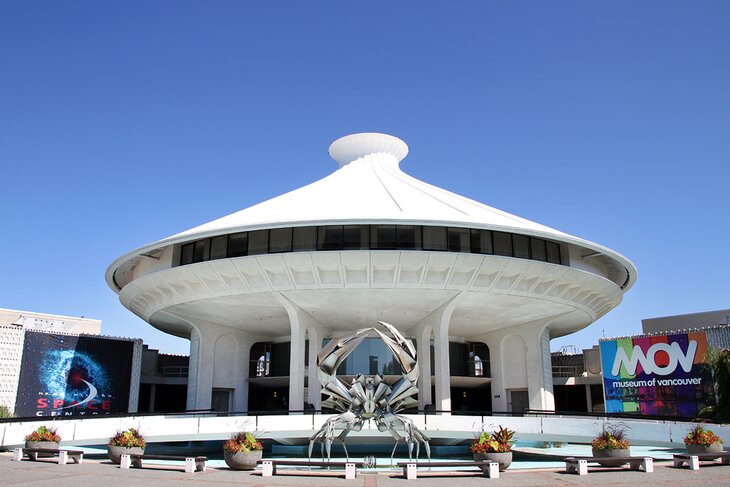
In Vanier Park near Burrard Bridge, the Museum of Vancouver is a large institution devoted to all things Vancouver. It covers the city's history from the first Coast Salish communities to Japantown, Kitsilano hippie days, and urban development. One of the more fascinating permanent exhibits is Neon Vancouver/Ugly Vancouver, a showcase of vintage neon signs that are a significant part of Vancouver's urban history.
In the same building is the HR MacMillan Space Centre, featuring a planetarium.
If you are staying downtown, catch the Aquabus across False Creek to Vanier Park and get off at the Maritime Museum Ferry dock.
Address: 1100 Chestnut Street, Vancouver, British Columbia
Queen Elizabeth Park
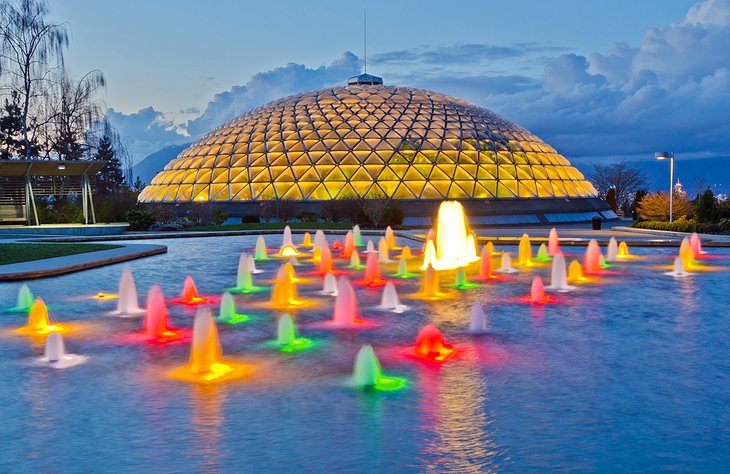
The center of Queen Elizabeth Park, Little Mountain, marks the highest point in Vancouver, and its elevated position affords excellent views of the city center and the mountains to the north.
Things to do in the park include pitch-and-putt golf, tennis, disc golf, and visiting the extensive outdoor arboretum. If the day is grey and cool, escape to the tropical environment of the Bloedel Conservatory with its free-flying birds.
Queen Elizabeth Park has an excellent restaurant called Seasons in the Park. Walk the park in the mid-morning, then stop in for lunch while you soak up the amazing views of downtown Vancouver.
The sunken Quarry Garden makes a lovely spot to stroll on a warm summer day. For more horticultural explorations, head a couple of blocks west to VanDusen Botanical Garden, where there is always something in bloom amid beds representing various regions and species.
Location: Cambie Street and West 33rd Ave, Vancouver, British Columbia
Take the Kids to Science World
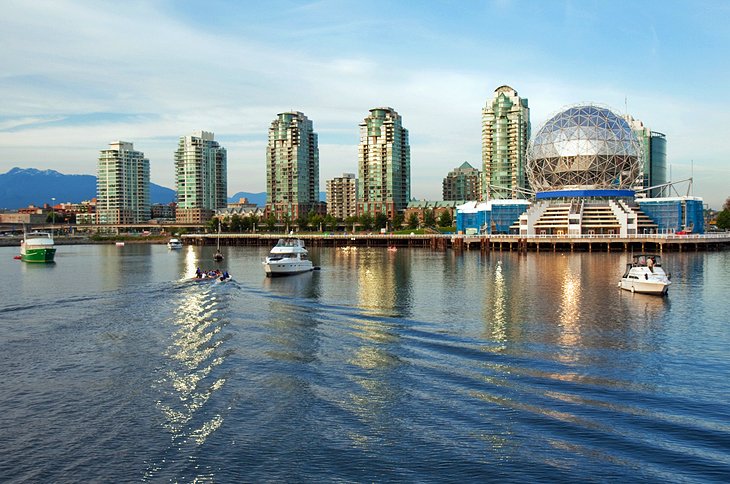
The futuristic sphere-like building of Science World is home to a child-friendly exploration center that explains phenomena through 12 hands-on exhibits and demonstrations. Themes include water, air, motion, and invention.
Visiting exhibits are often impressive and part of world tours. The building, which is an unmistakable waterfront landmark in Vancouver, was originally built for Expo 86, a World's Fair.
Address: 1455 Quebec Street, Vancouver, British Columbia
Enjoy the Sights of Richmond
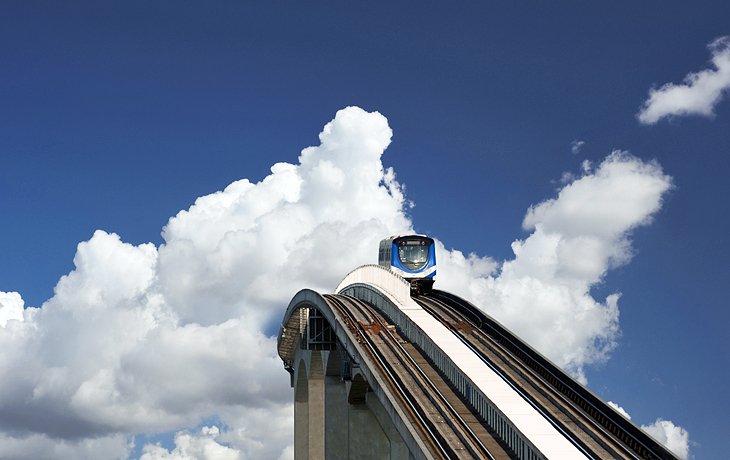
South of Vancouver, Richmond is Vancouver's second Chinatown, hence you'll see many shops with Chinese characters on their signs. If you crave authentic Chinese food, you are in the right spot. Hundreds of restaurants line the streets, serving delicious food.
Richmond is also packed with sightseeing attractions, from a renowned Buddhist temple to the picturesque former fishing village of Steveston, where you'll find waterfront restaurants and shops in restored old boatsheds. Located in the latter, the Gulf of Georgia Cannery National Historic Site is one of the most historic settings in Richmond, and it relays the history of the West Coast fishing industry.
Once you've had your fill of tourist attractions, head to the malls to find imported Asian goods and much more. In the warmer weather, come down at night, when vibrant night markets take place and are similar in nature to ones you'd find in Hong Kong.
Go Whale Watching
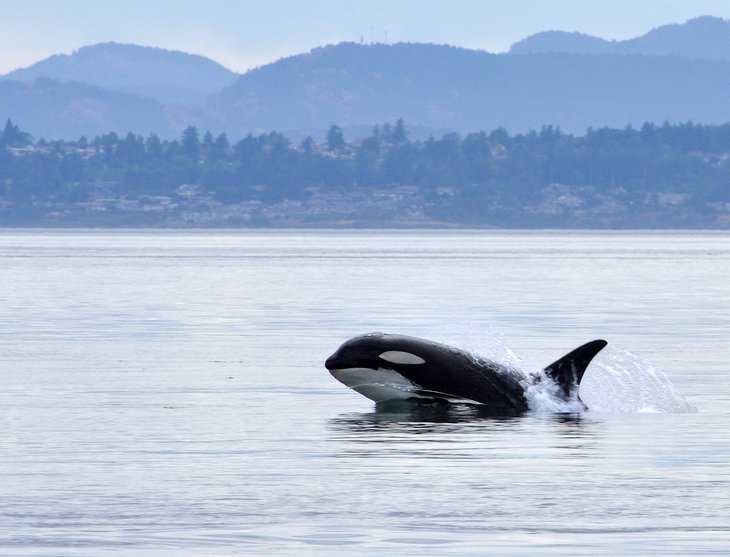
The waters off Vancouver's coastline, known as the Salish Sea, are an excellent place to see whales. Humpback and gray whales, along with smaller minke and orcas, swim in these waters.
The main whale watching season runs from March through October. Options for seeing the whales range from aerial viewing from a float plane to Zodiac boats, or for those looking for a more stable platform, larger tour boats. If you are lucky, you might even spot a few whales from the BC ferries that transit between Vancouver and Victoria.
Strict regulations are in place that limit how close the boats can get to the whales.
VanDusen Botanical Garden
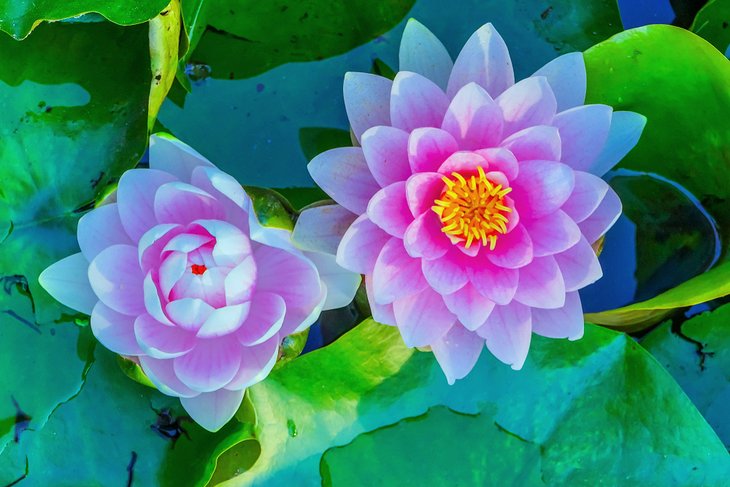
The British Columbia climate is ideal for producing spectacular displays of flowers, and there's no better place to see them in their full glory than the VanDusen Botanical Garden. The garden is conveniently located a short distance from downtown on Oak Street near the aforementioned Queen Elizabeth Park.
The garden is a pleasant place to wander, and something is always in bloom, no matter when you visit. To maximize your enjoyment, be sure to check out the bloom guide that the gardens put out on their website prior to each season.
Highlights of any visit include the cherry trees bursting into color in the spring followed by the rhododendrons and laburnums, then the roses and hydrangeas putting on their show in the summer. Come fall, the Japanese maples, ginkgo trees, and rudbeckia step up and do their part in impressing guests.
Travelling with kids? The Elizabethan Maze (a hedge maze) is a fun, interactive feature for all ages.
Vancouver Art Gallery
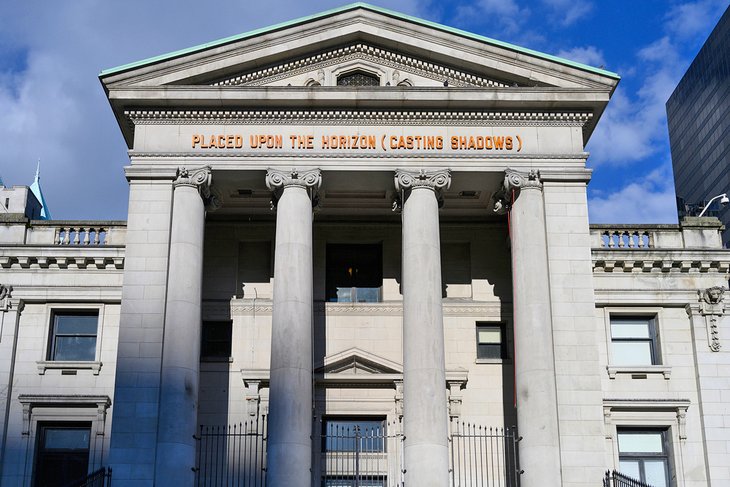
The Vancouver Art Gallery is the city's premier arts institution, located in Downtown Vancouver. The gallery presents innovative, world-class exhibitions year-round featuring the works of local and international artists on a rotating basis. The gallery's collection includes paintings by renowned BC artist Emily Carr (1871-1945), as well as contemporary works by Asia-Pacific and First Nations artists.
The façade of the building faces Robson Square, an interesting public space designed by Arthur Erickson, which includes a winter ice-skating rink and law courts.
The steps with their carved lions out front of the gallery are a popular meeting spot and demonstration site for whatever causes are in the news. The Vancouver Art Gallery is located on Hornby Street, not far from Robson Street, and a visit to both is easily accomplished.
Day Trip to Whistler or the Gulf Islands
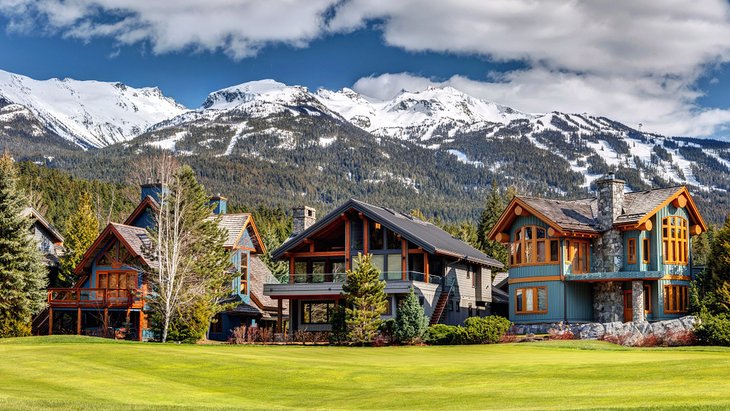
One of the most popular day trips is a drive along the Sea-to-Sky Highway to Whistler. If you want to do some sightseeing along the way, stop in at Squamish and Shannon Falls. Then, spend the afternoon wandering around Whistler Village, where you'll find shops, restaurants, and beautiful scenery around every corner.
If the weather is clear, a must-do is to ride the Peak 2 Peak gondola connecting Whistler and Blackcomb resorts. If you are lucky, you might get one of the cabins with a glass floor.
If you are a skier and you're visiting in winter, plan on a day of skiing here as the terrain is amazing and the conditions are usually good. Try to time your ski day midweek to avoid the weekend crowds.
Other popular day trips from Vancouver include visiting some of the Gulf Islands, like Salt Spring Island, or taking a ferry all the way to Victoria on Vancouver Island. Ferries to Victoria run regularly, and the trip to Victoria is only about 1.5 hours, but count on the one-way total door-to-door trip closer to 3-4 hours by the time you tack on getting to the terminals and the pre-board wait times.
Frequently Asked Questions
When is the best time to visit Vancouver?
| Average minimum and maximum temperatures for Vancouver, Canada in °C | |||||||||||
| J | F | M | A | M | J | J | A | S | O | N | D |
| 6 0 | 8 1 | 10 3 | 13 5 | 16 8 | 19 11 | 22 13 | 22 13 | 18 10 | 14 6 | 9 3 | 6 1 |
| PlanetWare.com | |||||||||||
| Average monthly precipitation totals for Vancouver, Canada in mm. | |||||||||||
| 150 | 125 | 109 | 76 | 61 | 46 | 36 | 38 | 64 | 114 | 170 | 178 |
| Average monthly snowfall totals for Vancouver, Canada in cm. | |||||||||||
| 21 | 9 | 4 | 1 | 0 | 0 | 0 | 0 | 0 | 0 | 3 | 19 |
| Average minimum and maximum temperatures for Vancouver, Canada in °F | |||||||||||
| J | F | M | A | M | J | J | A | S | O | N | D |
| 42 32 | 46 34 | 49 36 | 54 40 | 61 46 | 66 51 | 71 54 | 71 55 | 65 50 | 56 43 | 48 37 | 43 33 |
| PlanetWare.com | |||||||||||
| Average monthly precipitation totals for Vancouver, Canada in inches. | |||||||||||
| 5.9 | 4.9 | 4.3 | 3.0 | 2.4 | 1.8 | 1.4 | 1.5 | 2.5 | 4.5 | 6.7 | 7.0 |
| Average monthly snowfall totals for Vancouver, Canada in inches. | |||||||||||
| 8.1 | 3.4 | 1.6 | 0.2 | 0 | 0 | 0 | 0 | 0 | 0 | 1.0 | 7.3 |
Tourists tend to flock to Vancouver in the summer when the days are long and the sun is shining. The shoulder seasons of spring and fall are less busy, but the weather is a little less predictable. Even the winter — known for being dark and damp — has something to offer.
Spring: Vancouver experiences spring much earlier than the rest of Canada, and it is arguably when the city is at its most beautiful. It doesn't take long for the daffodils to poke out of the earth and for the infamous cherry blossoms to make an appearance, covering the city in delicate pink petals.
Of course, it takes rain to make flowers grow — and early spring can be a rainy time in Vancouver. Luckily, the temperatures this time of year are relatively warm, meaning it is still very pleasant to take in the sights of the city — though you may prefer to do so from under an umbrella.
In late spring, the rainy days become fewer, and the days get longer, but the crowds tend to stay away until the end of June. The late May to mid-June period offers the optimal conditions for a perfect Vancouver visit: great weather, but not too busy.
Summer: If you'd rather skip out on experiencing the notorious rain, then the summer months are your best bet for a visit to Vancouver. While there are no guarantees, the odds are good that you'll be treated to plenty of clear, sunny days in July and August, which are traditionally the warmest and driest months in Vancouver.
In the summer, the entire city tends to head outdoors. Whether exploring Stanley Park by bike, hiking the surrounding mountains, or just lounging at one of Vancouver's many beaches, there's simply no better way to experience summer in Vancouver than by being outside.
The fact that summer in Vancouver is spectacular is, unfortunately, not a very well-kept secret. Expect to pay a premium to enjoy summer in Vancouver, and always aim to show up early if you want to beat the crowds.
Fall: Fall in Vancouver can be somewhat hit or miss. If you happen to catch it on a "hit" day, then you're in for a real treat: crisp air, leaves changing colors, and clear views of the North Shore mountains as they get their first dusting of snow up top.
Hiking this time of year can be phenomenal. The bugs are a non-issue, the weather stays comfortable throughout the entire day, and the crowds of summer are long gone. Be mindful of hiking at elevation, as trails on the mountains can get covered in snow in the fall months. Always keep your eye on the time: as the daylight hours shrink, you are left with less time for those longer hikes.
Winter: While winter in the rest of Canada conjures up images of ice, snow, and bitter cold, that couldn't be further from winter in Vancouver. You'll want to dress properly if you visit Vancouver in the winter, but you're more likely to need to protect yourself from the rain than from the cold. The average temperature in Vancouver in January is 7 degrees Celsius (about 45 degrees Fahrenheit) — but the average rainfall for the month is about 140 millimeters (5.5 inches)!
While the rest of Canada is hibernating from the cold, people in Vancouver are able to get out and about thanks to its mild winters. The holiday season in Vancouver is, in a word, magical, with the Festival of Lights in VanDusen Gardens, the German-inspired Vancouver Christmas Market, and the spectacular Bright Nights at Vancouver's famous Stanley Park.
Though you're likely to experience at least some rain in the winter months, you also might get lucky with a few bluebird days. It isn't unusual to see people out on the golf course, even in the middle of winter!
If you're caught in a rainy spell, simply hop on a shuttle and head up to Whistler. Just two hours north of Vancouver, this world-renowned ski resort is best enjoyed in the winter months. If it's raining in Vancouver, chances are good that Whistler is getting covered in snow.
